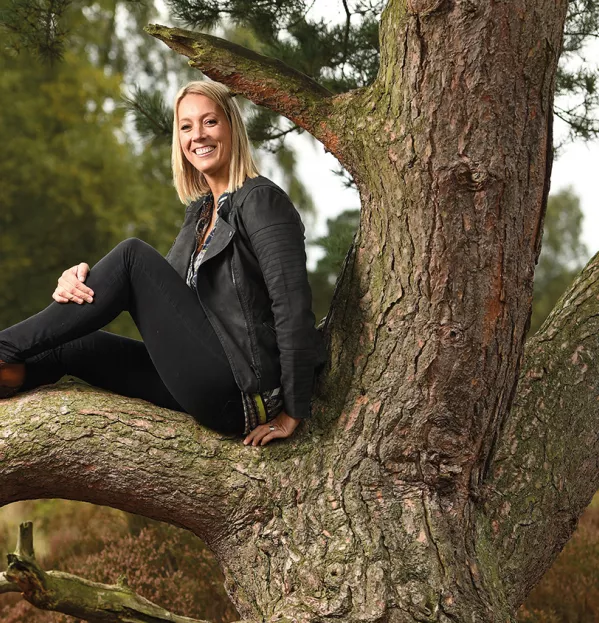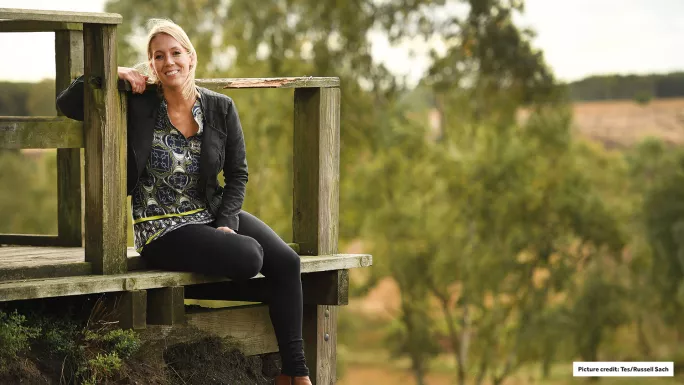Tes talks to... Kiki Archer

Kiki Archer can’t remember her school ever officially acknowledging that gay people existed.
“Well, unless you count the time we had to pick a subject for our religious studies coursework,” she clarifies.
“Homosexuality was on the list along with war, abortion and euthanasia as something that threw up a lot of questionable moral issues, so that was a great message for kids wasn’t it?”
That was years ago, you might argue: Archer is 37.
But she insists that the experience for young gay people has not really improved. And she should know: she worked as a PE teacher in secondary schools for several years from 2002, before she and her wife had their two children.
Since then, she has written eight bestselling novels, which she describes as “chick lit with a lady loving twist” (“They’re love stories - it just happens that two women do the falling in love”), the first of which was initially intended as a young adult novel. Those novels - and her campaigning for LGBT issues - have connected her with thousands of LGBT young people.
Teenage girls, in particular, are attracted to Archer’s fresh, accessible plotlines and humour. Social media enables these girls to contact Archer, giving her an important insight into their lives and how they are struggling with their sexuality at school.
Something isn’t adding up at the moment, and Archer thinks she knows why.
“The current perception is that sexuality is irrelevant to teenagers these days and that there is no stigma attached to coming out, but it’s not that straightforward,” she says.
“Kids are more clued-up about LGBT now because the media is doing a better job of being inclusive than it was 20 years ago. They can turn on the TV and see gay couples on soap operas, watch trans characters in films and read about teenagers struggling with their sexuality in books.
“But if they’re so cool with it, why do 45 per cent of LGBT teens report that they have been bullied for it at school? Why do less than a third of kids say that their school would feel like a safe place to come out?
“I’ll tell you why: it’s because of the disparity between what they see in the media and their experience of real life. The reality is that LGBT is still brushed under the carpet in most schools.”
‘Let down by the curriculum’
The figures Archer cites are backed up by the 2017 Stonewall Report, which found that half of LGBT pupils hear homophobic slurs regularly at school, three-fifths have self-harmed and only one-fifth have been taught about safe sex in relation to same-sex relationships.
So how, in a society that is more accepting than ever, are schools failing LGBT pupils?
“To start with, I think we’re let down by the curriculum,” says Archer. “It is currently not compulsory to include LGBT anywhere in the national curriculum, even in PSHE - which is not a statutory requirement to teach in secondary schools anyway,” she says.
And even when it is taught, she says teachers lack training.
“In schools where PSHE is taught, there is often no teacher assigned to the subject. Form teachers teach it to their own classes as best they can,” she says.
“But this means that it is often being delivered by teachers who are uncomfortable talking about LGBT issues to children. Sometimes no information is better than incorrect information, or information that’s glossed over or delivered uncomfortably, because that sends the message that it’s too shameful to be openly discussed.”
This brings her on to the issue of acceptance.
“To allow LGBT teenagers to question and ultimately accept and embrace their sexuality, we need to better represent it,” she argues. “The media is slowly getting there, but our schools are still lagging behind.”
So how do we change things?
She says schools have improved in the past 20 years. More gay teachers than ever are out at school, and this is now encouraged more than it was 10 years ago. But, she asks, how can a child recognise themselves when they are not represented in the curriculum?
“We need more books with LGBT characters available to read in schools, and not just coming out stories - books where characters just happen to be gay and they are accepted without comment,” says Archer. “Kids can read about mermaids, so why can’t they read about gay people? We vastly outnumbered mermaids last time I checked, but there are fewer story books about us.
“We need to see ourselves in set texts. We need visibility in science lessons with surrogacy and adoption covered at the same time as heterosexual reproduction. And where are we in maths questions? Thirty years ago, we started to see ethnic minorities and disabilities being represented in maths books and Sats papers. But where are the questions about Steve and Tom buying a bed to fit the dimensions of their bedroom?”
Seeing LGBT lifestyles represented in educational materials would be a big step forward, but Archer says support for teens struggling with their sexuality is also key.

This is something that Archer often encounters when LGBT young people contact her via social media.
“I welcome [the contact],” she says, “and I always respond to them. It’s important for them to be able to tell somebody how they’re feeling, and if that person is me, then that’s great. But I do often wonder why they choose me? Have they got nobody else? I love that they confide in me, but how sad if they haven’t got the option to talk it through with anyone at home or school.
“I wonder if there’s a way that schools could embrace social media to offer a way to talk through these issues with pupils? Logistically it would be difficult, but if they could organise it, it would be so effective.”
LGBT staff an asset
Until this is a possibility, Archer says that LGBT staff who are out and approachable are important assets to their schools.
“Kids love talking to teachers, and they used to come and talk to me about my sexuality. But they never came on their own - they’d come in groups and ask general questions. It’s great for acceptance and normalising, but less likely to appeal to the pupils who are struggling with their sexuality - they are unlikely to seek you out on their own and they won’t open up about it in a group. That’s where social media or maybe even an email address that they could contact with questions could come in really useful.
Staff also need to be aware of the isolation that LGBT teens often experience, especially girls. “It’s a huge generalisation, but what you often find with a gay or bisexual teen boy is that they are embraced by large groups of straight girls, so they have a wonderful, supportive social group to cushion them. But a lesbian teen is often rejected by their peers as a ‘misfit’, so if they are the only one, they have nobody, and an isolated target is easier to bully.”
She’s keen not to suggest all schools are failing in this area: some, she says, are doing incredible things and the rest of the profession needs to learn from them.
“There are schools out there that are embracing LGBT - they have exemplary PSHE, they have teachers who are out, designated people to talk to, an LGBT notice board, awareness days - and supporting their students,” she says. “I saw an article about a trans prom queen in the UK recently, and I thought that was amazing progress.
“But it’s often dependent on the leadership team. If the headteacher is LGBT-friendly, it often follows that the rest of the school will be. You’ve got to get right up into the SLT to address the issues in the schools that are failing pupils in this area.
“That’s where specialist training is really important in raising their awareness. There are some excellent organisations out there such as Diversity Role Models and Educate and Celebrate who are making a real difference to pupil attitudes and the way staff deal with homophobic bullying.
“There’s funding out there for their courses - schools need to be aware of this and use them because the results are life changing for many LGBT teens.”
So with training available and some visible improvements in the last 10 years, is she hopeful of a better situation for LGBT teens in schools?
“We’re getting there,” says Archer. “It’s painfully slow, but progress has been made. I wasn’t out at school. To be honest, it never really crossed my mind that I may be gay at the time, but if there’d been better education, awareness and openness about LGBT issues and we’d been aware that there were perfectly well functioning, happy and healthy gay teens and adults out there, then maybe when it was time for me to accept the person I truly was there wouldn’t have been as much angst, horror and humiliation - all of which was self-inflicted as much as inflicted by others. Today’s teenagers are ready for this. Schools need to catch up.”
Lisa Jarmin is a freelance writer. Kiki Archer’s latest book, A Fairytale of Possibilities, is out now
You need a Tes subscription to read this article
Subscribe now to read this article and get other subscriber-only content:
- Unlimited access to all Tes magazine content
- Exclusive subscriber-only stories
- Award-winning email newsletters
Already a subscriber? Log in
You need a subscription to read this article
Subscribe now to read this article and get other subscriber-only content, including:
- Unlimited access to all Tes magazine content
- Exclusive subscriber-only stories
- Award-winning email newsletters